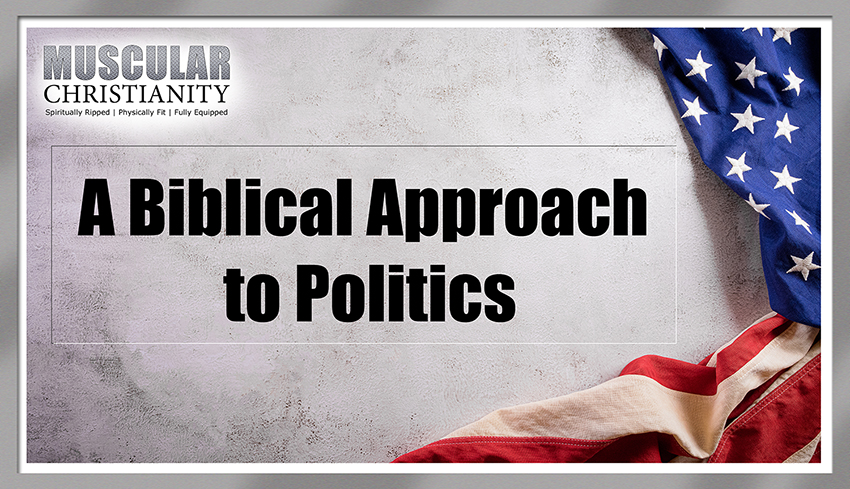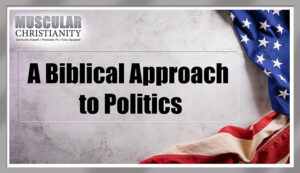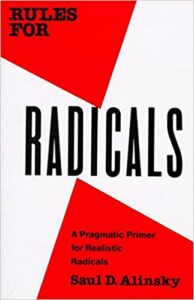The Separation of Church and State is a phrase often used by people who want to insist that Christianity had no real role in our nation’s founding – certainly nothing that had any significant influence on those that articulated our cause, created our Constitution and fought the battles that culminated in the surrender of Great Britain.
You see this in comments like what you see below from the “Freedom From Religion” website:
The Christian Right is trying to rewrite the history of the United States, as part of their campaign to force their religion on others who ask merely to be left alone. According to this Orwellian revision, the Founding Fathers of this country were pious Christians who wanted the United States to be a Christian nation, with laws that favored Christians and Christianity.
Not true! The early presidents and patriots were generally Deists or Unitarians, believing in some form of impersonal Providence but rejecting the divinity of Jesus and the absurdities of the Old and New Testaments.
You have to be very selective in the information you use to validate such a statement. At the same time, you have to be willfully oblivious to the specific references to God and Christ that punctuate the relevant events and documentation that established the United States.
Below is a brief yet potent list:
1) The Declaration of Independence
What qualified our statement to King George as a legitimate cause as opposed to a mere complaint is the way in which our Founders showed how his monarchy violated Divine Absolutes. However unjust or belligerent his administration may have been, it was the manner in which his rule restricted rights that were not his to dispense as much as they were God’s to guarantee – that is what gave our cause the Substance it needed to resonate as something that was True and not just preferred.
We hold these truths to be self-evident, that all men are created equal, that they are endowed by their Creator with certain unalienable Rights, that among these are Life, Liberty and the pursuit of Happiness.1
That is the starting point. The rights we have are God-given and the governments that are established by men to ensure those rights, but…
…whenever any Form of Government becomes destructive of these ends, it is the Right of the People to alter or to abolish it, and to institute new Government, laying its foundation on such principles and organizing its powers in such form, as to them shall seem most likely to effect their Safety and Happiness.2
We are founded on a Biblical Absolute and not a legal argument.
2) Sixteen Congressional Proclations for Fasting
During the eight years we were at war with Great Britain, Congress proclaimed a National Day of Fasting, Prayer and Humiliation 16 different times. You can view an image of those proclamations as they are preserved in the Library of Congress as well as a readable transcription by clicking here.
The verbiage of these proclamations is not conducive to an all-inclusive dynamic as far as it being something that accommodates all faiths. Rather, it specifies Christ and a need to seek His Forgiveness and Direction.
For example, a portion of the Proclamation from March 20, 1781 reads as follows:
The United States in Congress assembled, therefore do earnestly recommend, that Thursday the third of May next, may be observed as a day of humiliation, fasting and prayer, that we may, with united hearts, confess and bewail our manifold sins and transgressions, and by sincere repentance and amendment of life, appease his righteous displeasure, and through the merits of our blessed Savior, obtain pardon and forgiveness:
There’s a couple of things that are worth noticing: First, the committee that was tasked with drafting this proclamation included James Madison who many want to believe to be a Deist. Someone with that kind of spiritual temperament would not be advocating Christ as “our blessed Savior.”
Secondly, to characterize Congress as a humanistic enterprise that placed no priority on the Reality and the Necessity of Divine Intervention requires a willful disregard for the repeated directives that came from their collective pen that recommended an intentional timeframe dedictated to an intensely focused and humble posturing before Jesus Christ.
In 1854, James Meacham, the Representative from Vermont, delivered a report pertaining to an issue involving the First Amendment. At one point, he said this:
Down to the Revolution, every colony did sustain [the Christian] religion in some form. It was deemed peculiarly proper that the religion of liberty should be upheld by a free people. Had the people, during the Revolution, had a suspicion of any attempt to war against Christianity, that Revolution would have strangled in its cradle. At the time of the Constitution and the amendments, the universal sentiment was that Christianity should be encouraged, not any one sect. Any attempt to level and discard all religion would have been viewed with universal indignation.3
In the same report, Meacham concluded by saying:
In this age there can be no substitute for Christianity; that, in its general principles, is the great conservative element on which we must rely for the purity and permanence of free institutions. That was the religion of the founders of the Republic, and they expected it to remain the religion of their descendants.4
The first words of the Treaty that represented Great Britain’s surrender to America in 1783 were:
In the Name of the most Holy & undivided Trinity.5
The Liberty Bell was used to summon delegates to Pennslyvania Hall to discuss the matters of the day. Benjamin Franklin wrote to Catherine Ray in 1755, “Adieu, the Bell rings, and I must go among the Grave ones and talk Politicks.”6
It’s most famous tolling, however, was on July 8, 1776 when it was used to summon the townspeople to hear the public reading of the Declaration of Independence.7
Yet, up until that point, the bell wasn’t seen as an icon as much as it is today because of the way the text that’s inscribed on the bell was applied to the issue of slavery in 1844.
The inscription is Leviticus 25:10:
Proclaim liberty throughout all the land unto all the inhabitants thereof. (Lev 25:10 [KJV])
William Lloyd Garrison, abolitionist and publisher of The Liberator, reprinted a poem written by H.R.H. Moore which represented the first documented use of the name, “The Liberty Bell.” Garrison saw it as an appropriate and effective way to combine the Biblical substance of the verse inscribed on the bell with the poetry of Moore which included the line, “Ring it, till the slave is free” and let the collective meaning serve as a rebuke against those who supported slavery.
In an article printed in Time Magazine, Dr Ben Carson tells of how when the body of Abraham Lincoln was laid in Independence Hall, he was placed in a manner where the Liberty Bell and the inscription was directly overhead. During the 20 hour public viewing, over 150,000 people paid their respects to the Great Emancipator.
In the article penned by Dr Carson, he concludes by saying:
Whether you’re black or white, Democrat or Republican, The Liberty Bell’s true story reminds Americans of all stripes that our nation’s history—and future—belongs to us all. It challenges us to tear down systems that hold us captive and honor the price great men and women have paid to cast and re-cast the American mold to form a more perfect union.8
The story of the Liberty Bell and the nation it represents possesses the profound and essential content that it does because of how it points to a Divine Absolute and not just a desired political climate.
5) Washington’s General Orders
On May 2, 1778, General Washington issued the following General Orders:
The Commander in Chief directs that divine Service be performed every Sunday at 11 o’clock in those Brigades to which there are Chaplains—those which have none to attend the places of worship nearest to them—It is expected that Officers of all Ranks will by their attendance set an Example to their men.
While we are zealously performing the duties of good Citizens and soldiers we certainly ought not to be inattentive to the higher duties of Religion—To the distinguished Character of Patriot, it should be our highest Glory to add the more distinguished Character of Christian—The signal Instances of providential Goodness which we have experienced and which have now almost crowned our labors with complete Success, demand from us in a peculiar manner the warmest returns of Gratitude & Piety to the Supreme Author of all Good.9
George Washington made frequent references to the Power and Goodness of God throughout his career as the Commanding General of the Continental Army as well as his time as Commander in Chief.
The fact that he made a point of ensuring that Christian worship services were held throughout the army he commanded and made it clear that he expected his officers to lead by example by being both present and engaged reveals the priority he placed on the acknowledgement of the “Supreme Author of all Good.”
While enduring the hardship and lethal challenges of the winter spent at Valley Forge, Washington directed his troops to set aside a day for thanksgiving and fasting. On December 18, 1777, Reverend Israel Evans delivered one of the sermons and Washington later wrote him to thank him. In that letter, he said:
…it will ever be the first wish of my heart to aid your pious endeavours to inculcate a due sense of the dependence we ought to place in that all-wise and powerful Being, on whom alone our success depends.10
6) Third Verse of our National Anthem
Our national motto is derived from the third verse or our National Anthem:
Praise the Pow’r that hath made and preserv’d us a nation!
Then conquer we must, when our cause is just,
And this be our motto: “In God is our trust“
Yet again another example of how many recognize that the “separation” of church and state doesn’t mean the elmination of the church and its influence on the state.
7) The Thoughts of Thomas Jefferson
The Four Evangelists
Thomas Jefferson did not believe in the divinity of Christ, but he nevertheless looked to the Bible as the greatest source of moral teachings known to man:
…there never was a more pure and sublime system of morality delivered to man than is to be found in the four evangelists.24
That was Jefferson’s primary justification for admiring the Christian faith, while not subscribing to it completely. But before one can dismiss Jefferson’s perspective as being inconsequential to the way in which it contributed to the philsophical structure of the American government, you have to first acknowledge the way in which he pointed to the Scriptures as being the Standard that defined moral behavior:
…the religion of Jesus is founded on the Unity of God, and this principle chiefly, gave it triumph over the rabble of heathen gods then acknoleged. thinking men of all nations rallied readily to the doctrine of one only god, and embraced it with the pure morals which Jesus inculcated.25
The following quote is anecdotal, meaning that you won’t find it in anything written by Jefferson himself. But it’s nevertheless preserved in the Library of Congress as an exchange between Jefferson and a friend of his that was observed by Reverend Ethan Allen who was the pastor of Christ Church where Jefferson attended. Seeing him on his way to church one Sunday, Jefferson’s friend asked him where he was going. Jefferson responded by saying he was on his way to church to which his friend responded with a bit of surprise asking him why he would go to church when he didn’t believe a word of it. Jefferson replied by saying,
No nation has ever existed or been governed without religion nor can be. The Christian religion is the best religion that has been given to man and I, as Chief Magistrate of this nation, am bound to give it the sanction of my example.26
Again, it isn’t documented anywhere in Jefferson’s writings, but it’s credibility is believable given it’s place within the Library of Congress and the fact that it captures both the outward behavior and the documented inner workings of Jefferson’s mind when it came to the substance of the Christian faith.
Thomas Jefferson’s orthodoxy wasn’t at all with what most would regard as doctrinally sound. While he believed that Jesus represented the greatest expositor of moral standards ever, Jefferson did not subscribe at all to His Deity.11
In a letter to Thomas B. Parker in 1819, he said:
my fundamental principle would be the reverse of Calvin’s, that we are to be saved by our good works which are within our power, and not by our faith which is not within our power.12
But while his convictions pertaining to the Gospel of Jesus Christ may have been questionable, he still saw religion as being a necessary component to the philosphical foundation a government had to be based on in order to define and defend an individual’s rights.
You see this in a letter he wrote to P.H. Wendover in 1813. Jefferson, referring to the discourses of a Mr. McCloud, says…
I feel my portion of indebtment to the reverend author for the distinguished learning, the logic and the eloquence with which has proved that religion, as well as reason, confirms that soundness of those principles on which our government has been founded and its rights asserted.13
In addition, while serving in the House of Burgesses, Thomas Jefferson worked alongside Patrick Henry and Richard Henry Lee to craft a resolution for the state of Virginia to set aside a day of fasting and prayer. He said…
We were under conviction of the necessity of arousing our people from the lethargy into which they had fallen as to passing events; and thought that the appointment of a day of general fasting and prayer would be most likely to call up and alarm their attention.14
Later, he wrote that the reaction was like a “shock of electricity…”
We returned home, and in our several counties invited the clergy to meet assemblies of the people on the 1st of June [actually at various times in June and July], to perform the ceremonies of the day, and to address to them discourses suited to the occasion. The people met generally, with anxiety and alarm in their countenances, and the effect of the day thro’ the whole colony was like a shock of electricity, arousing every man and placing him erect and solidly on his centre.15
The bottom line is that Thomas Jefferson saw in Christianity a reliable and needed foundation that, while it could not be coerced, could nevertheless support a legitimate assertion of individual rights and justify a national pursuit of independence.
8) The Testimony of John Adams on the Second Continental Congress
John Adams and Thomas Jefferson corresponded frequently after they had both retired from public life. In one particular letter, Adams and Jefferson were discussing a recent comment that had found its way into print that suggested that “Science and Morals are the great Pillars on which this Country has been raised to its present population, Opulence and prosperity, and these alone, can advance, Support and preserve it.”16
In his letter to Jefferson, Adams disagreed and he articulated his position in part by saying…
The general Principles, on which the Fathers Achieved Independence, were the only Principles in which, that beautiful Assembly of young Gentlemen could Unite, and these Principles only could be intended by them in their Address, or by me in my Answer. And what were these general Principles? I answer, the general Principles of Christianity, in which all those Sects were United…17
Among those that comprised the Second Continental Congress you had men that owned slaves and those that despised the slave trade. In addition, you had varying temperaments, vocations, as well as different philosophies when it came to loyalty to the crown.
Adams was part of the five-man team tasked with writing the “Declaration of Independence.” Whatever was getting ready to be sent to King George had to be both substantial and unanimous. But how do you unite a group of statesmen with such different backgrounds and perspectives given the risks that were involved?
As one who was there to witness it first hand, Adams could confidently say that it was because of the way each of the delegates could come together beneath the umbrella of their Christian faith that they were able to outline our country’s position with one voice.
9) The Impact of the Great Awakening
A Remarkable Incident
A remarkable incident at the beginning of the Revolutionary War testifies to the great evangelist’s hold on the imagination of ordinary Americans. In the fall of 1775, a New England force, commanded by Benedict Arnold (1741-1801), was recruited to invade Canada and capture Quebec. Arriving in Newburyport, Massachusetts, where Whitefield was buried in 1770, the officers descended into the church crypt, opened Whitefield’s coffin, removed his clerical collar and wristbands, cut them in pieces, and passed them out to the troops. The distribution of these Great Awakening amulets showed in its eerie way that men facing stress and anxiety wanted links to a preacher of a living God, not the latest London edition of Locke.21 One need look no farther for the reason evangelicalism demolished deism in eighteenth-century America.22
Anytime your relationship with Christ becomes defined more by a routine and an institution as opposed to a personal rapport with your King, your perspective on yourself and the world around you suffers. You see yourself exclusively in terms of your circumstances and the Purpose, Peace and Power that flows from an intentional focus on God and His Truth is overshadowed by the thought of who you are as opposed to Whose you are (Is 43:1; Matt 10:30-31; Phil 2:13; Rev 20:15).
From 1735-1743, preachers like George Whitefield and Jonathan Edwards were able to profoundly impact the colonies by proclaiming the Gospel in a way that emphasized the personal aspect of an authentic relationship with Christ. As opposed to sacraments and religious gestures, ministers like Whitefield and Edwards directed their listeners to the Gospels where it could be readily seen that it was a personal decision to believe in the empty tomb that secured one’s salvation.
The basic themes of the Great Awakening included:
- All people are born sinners (Rom 3:23)
- Sin without salvation will send a person to hell (Eph 2:8-9)
- All people can be saved if they confess their sins to God, seek forgiveness and accept God’s grace (Rom 10:9-10)
- All people can have a direct and emotional connection with God (Gal 3:28)
- Religion shouldn’t be formal and institutionalized, but rather casual and personal (Rom 8:15; Gal 4:6)18
While the essential doctrines being espoused may not have directly impacted the colonies’ collective dispostion towards Independence, between 1700 and 1740, an estimated 75-80 percent of Americans were actively attending churches which were, “…being built at a headlong pace.”19 This was a result of the Great Awakening and it was this ever growing constituency of believers that provided the material and philosophical support for the Revolution because of the way they were now rethinking the manner in which their rights were, in fact, guaranteed by God and not dispensed by a monarch.
This change in their perspective was due in a large part to the way in which Revolutionary War era ministers were endorsing America’s resistance to the crown as a biblically sanctioned cause. And because you had such a large majority of colonists now attending worship services, the result was a unified group of patriots that were linking arms across those borders previously defined by state sanctioned churches and vivid denominational differences.
Dr. James Hutson from the Library of Congress explains…
The plain fact is that, had American clergymen of all denominations not assured their pious countrymen, from the beginning of the conflict with Britain, that the resistance movement was right in God’s sight and had His blessing, it could not have been sustained and independence would not been achieved. Here is the fundamental, the indispensable, contribution of religion and its spokesmen to the coming of the American Revolution.20
10) Jefferson’s Approval of Federal Resources for Christian Worship Services
While serving as President, he made a point of attending church every Sunday and he made available Federal Buildings and the Marine Band for worship services. Dr. James Hutson, in his book “Religion and the Founding of the American Republic,” states…
It is no exaggeration to say that, on Sundays in Washington during Thomas Jefferson’s presidency, the state became the church.23
Today’s interpretation of the “separation of church and state” does not square at all with Jefferson’s allocation of state resources for expressly Christian worship services. In order for his adminstrative acts to not conflict with his letter to the Danbury Baptists, it is logically mandated to rethink the notion that the First Amendment refers to the elimination of all reference to Scripture as a basis for our laws and political philosophy.
The issue was not the Authority of the Word of God. Rather, the issue of the separation of church and state was whether or not the government could impose a uniform approach to the Throne of God. It was the way that different states and their sanctioned churches could tax their constituents and take from those monies a portion to support a specific denomination, or the manner in which certain states required you to be a member of a particular church in order to run for public office. This was the sort of politically mandated spirituality that permeated 18th century America. The “separation of church and state” had nothing to do with whether or not you could legally kill your child before it was born or if it was legally feasible to redefine the institution of marriage.
11) The Resolve of the First Continental Congress to Begin with Prayer
The first meeting of the Continental Congress happened on September 5, 1774. Among the first things that was decided was that each session should be opened up in prayer by Rev. Jacob Duche‘. While his initial presentation was typical of what might be expected from a man of the cloth, he then began to pray in a manner that was obviously unscripted.
Silas Deane, the Connecticut delegate, recorded that…
He read the lessons of the day, which were accidentally extremely applicable, and they prayed without book about ten minutes so pertinently, with suchfervency, purity and sublimity of style and sentiment, and with such an apparent sensibility of the scenes and business before, that even Quakers shed tears.24
The starting point for the First Continental Congress was not a casual, “remove your hat” kind of prayer. It was an intentional and passionate appeal for wisdom that resonated with everyone, regardless of their orthodoxy.
12) The Comments of Benjamin Franklin
June 28, 1787 was a Thursday. The Revolutionary War had been won and representatives of each state from the newly formed “United States of America” were now meeting to create a Constitution.
Progress had been very slow. Several weeks of unproductive deliberation inspired Dr. Benjamin Franklin to stand up and make a suggestion. His words are recorded by James Madison and can be read in the minutes of the Federal Convention as they’re preserved in “Elliot’s Debates, Volume 5, p253.”
Mr. President, the small progress we have made after four or five weeks’ close attendance and continual reasonings with each other – our different sentiments on almost every question, several of the last producing as many noes as ayes–is, methinks, a melancholy proof of the imperfection of the human understanding. We indeed seem to feel our own want of political wisdom, since we have been running about in search of it. We have gone back to ancient history for models of government, and examined the different forms of those republics which, having been formed with the seeds of their own dissolution, now no longer exist. And we have viewed modern states all round Europe, but find none of their constitutions suitable to our circumstances.
In this situation of this assembly, groping, as it were, in the dark, to find political truth, and scarce able to distinguish it when presented to us, how has it happened, sir, that we have not hitherto once thought of humbly applying to the Father of lights to illuminate our understandings?
In the beginning of the contest with Great Britain, when we were sensible of danger, we had daily prayer in this room for the divine protection. Our prayers, sir, were beard, and they were graciously answered. All of us who were engaged in the struggle must have observed frequent instances of a superintending Providence in our favor. To that kind Providence we owe this happy opportunity of consulting in peace on the means of establishing our future national felicity. And have we now forgotten that powerful Friend? Or do we imagine that we no longer need his assistance?
I have lived, sir, a long time, and, the longer I live, the more convincing proofs I see of this truth – that God governs in the affairs of men. And if a sparrow cannot fall to the ground without his notice, is it probable that an empire can rise without his aid? We have been assured, sir, in the sacred writings, that “except the Lord build the house, they labor in vain that build it.” I firmly believe this; and I also believe that without his concurring aid we shall succeed, in this political building, no better than the builders of Babel. We shall be divided by our little partial local interests; our projects will be confounded; and we ourselves shall become a reproach and by-word down to future ages. And, what is worse, mankind may hereafter, from this unfortunate instance, despair of establishing governments by human wisdom, and leave it to chance, war. and conquest.25
Franklin’s suggestion authenticates the way in which the Continental Congress collectively sought the Wisdom of God during the War of Independence and it also shows the disposition of one of its elder statesmen as far as the Reality and Necessity of God’s Assistance in establishing an enduring and effective government.
For more reading on this, click here.
13) The Reaction of the House of Burgesses to the Boston Tea Party
Remember the “Boston Tea Party?”
Today it would’ve been around $1,000,000.00 worth of tea. It took the colonists 3 full hours to empty the British ship of its 342 chests of tea into the harbor.26
America had repeatedly asked for representation in Parliament in order to facilitate a more comprehensive approach to taxes only to be taxed with even greater indifference and aggression. The colonies decided the best way to respond was to simply eliminate one of the major things that was being taxed. Perhaps then King George would be willing to pay more attention to the petition of his subjects.
The ”Boston Tea Party” did succeed in getting King George’s attention. But instead of a more productive dialogue, Boston harbor was closed, free elections of town officials were ended, colonists were required to quarter British soldiers on demand and Massachusetts was placed under martial law.
When Virginia learned of the crown’s tyrannical disposition, rather than taking to the streets and staging demonstrations, instead the House of Burgesses proclaimed a day of fasting and prayer to avert “the heavy calamity which threatens destruction to our civil rights.”27
This was the Fast that was written in part by Thomas Jefferson referenced earlier. The thing to be noticing is that you have a collective resolve to respond to current events by seeking out the Assistance and the Power of God.
The first part of the Proclamation reads as follows:
This House being deeply impressed with Apprehension of the great Dangers to be derived to British America, from the hostile Invasion of the City of Boston, in our Sister Colony of Massachusetts Bay, whose Commerce and Harbour are on the 1st Day of June next to be stopped by an armed Force, deem it highly necessary that the said first Day of June be set apart by the Members of this House as a Day of Fasting, Humiliation, and Prayer, devoutly to implore the divine Interposition for averting the heavy Calamity, which threatens Destruction to our civil Rights, and the Evils of civil War; to give us one Heart and one Mind firmly to oppose, by all just and proper Means, every Injury to American Rights, and that the Minds of his Majesty and his Parliament may be inspired from above with Wisdom, Moderation, and Justice, to remove from the loyal People of America all Cause of Danger from a continued Pursuit of Measures pregnant with their Ruin.
Ordered, therefore, that the Members of this House do attend in their Places at the Hour of ten in the Forenoon, on the said 1st Day of June next, in Order to proceed with the Speaker and the Mace to the Church in this City for the Purposes aforesaid; and that the Reverend Mr. Price be appointed to read Prayers, and the Reverend Mr. Gwatkin to preach a Sermon suitable to the Occasion.
Ordered, that this Order be forthwith printed and published. By the House of Burgesses.28
This was the way in which both the populace and those that represented them positioned both their resolve and their perpsective. This was not secular statesmanship nor was it reckless rebellion. It was a determined effort to qualify every word and every action according to the Wisdom and Provision of God.
14) The Black Robe Regiment
Peter Oliver was a lawyer and by the time of the Revolution had risen to the position of chief justice of the Superior Court in Massachusetts. He was incredibily wealthy and served in a variety of community and church positions and was fiercely loyal to the crown.
His perspective on the Revolutionary War was that of a Tory. Unlike the way in which most historians present John Adams and other such Patriots as noble statesmen, Oliver saw them as deluded troublemakers.
Not long after Cornwallis’ surrender, Oliver published a book entitled, “Origin and Progress of the American Rebellion: A Tory View.” What makes his perspective valuable is that he has nothing to gain by glamorizing or exaggerating any one aspect of the American effort to win their independence, in that he views all of it as a form of sedition.
At one point, he sets aside an entire section of his text to describe the “Black Regiment.”
He begins by saying…
It may not be amiss, now, to reconnoitre Mr. Qtis’s black Regiment, the dissenting Clergy, who took so active a Part in the Rebellion.29
He elaborates on the “dissenting clergy” as flawed ministers, who according to Oliver, were ordained only because of a grave mistake having been made by the Governors of the Church of England. He identifies several men of the cloth including Jonas Clark, Dr. Charles Chaucy and others as being, not only members of the Regiment, but also extremely influential. He references two annual conferences that hosted pastors from all of the state and it was there that the “Black Regiment” was able to exert a substantial amount of influence in the name of rebellion and evil.
In this Town was an annual Convention of the Clergy of the Province, the Day after the Election of his Majestys Charter Council; and at those Meetings were settled the religious Affairs of the Province; & as the Boston Clergy were esteemed by the others as an Order of Deities, so they were greatly influenced by them. There was also another annual Meeting of the Clergy at Cambridge, on the Commencement for graduating the Scholars of Harvard College*, at these two Conventions, if much Good was effectuated, so there was much Evil. And some of the Boston Clergy, as they were capable of the Latter, so they missed no Opportunities of accomplishing their Purposes. Among those who were most distinguished of the Boston Clergy were Dr. Charles Chauncy, Dr. Jonathan Mayhew & Dr. Samuel Cooper?* & they distinguished theirselves in encouraging Seditions & Riots, untill those lesser Offences were absorbed in Rebellion.30
You see Oliver’s “concern” reiterated on multiple occasions and in different ways.
The bottom line is that the mindset of the Patriot looking to separate from England was more than just a political preference, it was something justified and endorsed by the Word of God and it was the clergy that reinforced that message in the context of the sermons they preached and the example they set.
You can read more by clicking here.
15) Holland’s Observation of the Continental Army
The Commander in Chief directs that divine Service be performed every Sunday at 11 o’clock in those Brigades to which there are Chaplains—those which have none to attend the places of worship nearest to them—It is expected that Officers of all Ranks will by their attendance set an Example to their men.33
Not every Englishman disagreed with America’s quest for freedom. Even William Pitt, England’s Prime Minister who served from 1766 – 1778 was an outspoken critic of the monarchy’s perspective on the colonies. He said, “The spirit which now resists your taxation in America, is the same which formerly opposed loans, benevolences, and ship-money, in England… the same spirit which established the great, fundamental, essential maxim of your liberties, that no subject of England shall be taxed but by his own consent.”31
It was because of this subtle support of the colonies that King George had to turn to paid mercenaries in order to adequately staff the army he would send to the Americas. But even foreign powers were hesitant to war against the Patriots in New England.
When George appealed to Holland for assistance, John Derk van der Capellen, one of their more prominent nobles, expressed his opinion to his fellow countrymen by saying:
In what an odious light must this unnatural civil war appear to all Europe, a war in which even savages . . . refuse to engage; more odious, still, would it appear for a people to take a part therein who were themselves once slaves, bore that hateful name, but at last had spirit to fight themselves free. But, above all, it must appear superlatively detestable to me, who think the Americans worthy of every man’s esteem and look upon them as a brave people, defending in a becoming, manly and religious manner those rights which, as men, they derive from God, not from the legislature of Great Britain.32
Capellen was saying that it didn’t reflect well on the English to be fighting a war against the Americans who, not only were correct in the way they saw their rights as being entitlements guaranteed by God and not dispensed by a king, but also as a people resolved to resist in a “religious manner.”
Throughout the war, not only was General Washington adamant in encouraging a perpetual state of reverence and gratitude to God (see sidebar), but Congress also frequently admonished their populace to fast and repent.34
The fact that the United States was so determined to be consistent in the way they conducted themselves before God as they fought against King George played a large part in how other nations viewed the Revolutionary War.
16) The Rationale of John Locke
In his Second Treatise of Government, John Locke dismantled the flawed philosophy supporting the idea that monarchs could justify their authority over their subjects by claiming to be Divinely superior to any human court or governing body.35
He said…
For Men being all the Workmanship of one Omnipotent, and infinitely wise Maker; All the Servants of one Sovereign Master, sent into the world by his order and about his business, they are his Property, whose Workmanship they are, made to last during His, not one another’s Pleasure.36
By saying that all men were the “…workmanship of one omnipotent and infinitely wise maker,” he was stripping away the manufactured rank and title that some had asserted as a way to elevate themselves over their peers. Rather, we were to perceive ourselves as equals having been created by God for His Purpose and not our own.
Locke had a profound impact on those tasked with crafting the “Declaration of Independence.” You can see both his verbiage and his thinking represented in the opening lines penned by Thomas Jefferson when he said:
We hold these truths to be self-evident, that all men are created equal, that they are endowed by their Creator with certain unalienable Rights, that among these are Life, Liberty and the pursuit of Happiness.37
While many throughout history would sort men according to distinguished sounding titles and family crests, we built our argument on the platform that says our rights are not a king’s to dispense, but they are God’s to guarantee.
The fact that you and I are created in the image of God is what was used to ensure our Declaration resonated as a legitimate cause and not just a mere complaint. And it’s because we bear His Likeness that this isn’t just another day and you’re not just another face in the crowd. Your life is more than your situation and you are more than your mistakes.
That’s the Reality of God and the beauty of grace.
We are not just existing, we are seen…
…and you weren’t merely “sorted…”
You were created.
17) Washington’s Farewell Address
The war was over. Our Independence had been won and George Washington was getting ready to retire from public service after having, not only commanded the Continental Army, but also having served as our nation’s first president for two consecutive terms.
As he was getting ready to retire, he wrote a circular to be distributed to all the states that would serve as his farewell address on June 8, 1783.
He concluded his letter by saying the following:
I now make it my earnest prayer, that God would have you and the State over which you preside, in his holy protection that he would incline the hearts of the Citizens to cultivate a spirit of subordination & obedience to Government, to entertain a brotherly affection and love for one another, for their fellow Citizens of the United States at large and particularly for their brethren who have served in the field—and finally that he would most graciously be pleased to dispose us all to do Justice, to love mercy and to demean ourselves, with that Charity, humility & pacific temper of mind, which were the Characteristics of the Divine Author of our blessed Religion & without an humble imitation of whose example in these things, we can never hope to be a happy Nation.38
Washington was quoting from Micah 6:8. But he was doing more than simply extending a stately nod to the majesty of Scripture. He was emphasizing that the success of the states and the prospect of being a, “…happy Nation” was bound up in the extent to which its citizens labored to obey Scripture and imitate Christ (Eph 5:1).
Modeling yourself after Christ is not merely being “nice.” To imitate Him is to be the best version of yourself in whatever it is that you do (2 Cor 9:8).
Think about it.
When your focus is on Christ, you’re doing the right thing at the right time in the right way for all the right reasons.
If you want to be successful and prosperous, according to Joshua 1:8, then both your schedule and your strength are going to be coming from Him.
That’s the secret to success. It’s not so much a “plan” as much as it is a Person – your relationship with Him and your commitment to follow His Instructions.
Make a point of involving your King in the details of your life. When you do, you’re following in the footsteps of some truly amazing individuals including George Washington who would certify your approach as something that would produce both a happy individual…
…as well as a happy Nation!
18) Letter Read to Parliment by Sir Richard Sutton
In the book “Principles and Acts of the Revolution,” there is what is documented as “An authentic account of Friday’s debate on the second reading of the bill for regulating the civil government of Massachusetts Bay.” This is the “minutes” of a Parliamentary session that happened in London on April 26, 1774.
At one point, Sir Richard Sutton rose to read a letter from a crown appointed governor that described the disposition of the colonists…
Sir Richard Sutton read a copy of a letter, relative to the government of America, to the board of trade, shewing that, at the most quiet times, the dispositions to oppose the laws of this country were strongly ingrafted in them, and that all their actions conveyed a spirt and wish for independence. If you ask an American who is his master? he will tell you that he has none, nor any governor but Jesus Christ.39
19) The Writings of Samuel Adams
John Locke: The Law and the Light of Nature
John Locke refers to the “Law of Nature” in his Second Treatise of Government. He defines that Law in his Questions Concerning the Law of Nature:
This law of nature can, therefore, be so described [as a law] because it is the command of the divine will, knowable by the light of nature, indicating what is and what is not consonant with a rational nature, and by that every fact commanding or prohibiting.42
Locke saw the Law of Nature as the system of Absolutes put in place by God Himself that define the difference between right and wrong and establishes the inherent dignity and worth of every person.
The “Light of Nature” is the means by which humanity is able to discern the “Law of Nature.”
Again, in his Questions Concerning the Law of Nature, he says
But, when we say that something is known by the light of nature, we would signify nothing but the kind of truth whose knowledge man can, by the right use of those faculties with which he is provided by nature, attain by himself and without the help of another.43
In other words, it is something intuitive that does not have to be taught and because man is made in the Image of God, it is therefore an innate faculty that God Himself has placed in the mind of every human being.44
On November 20, 1772, the town of Boston adopted a piece written by Samuel Adams, the cousin of John Adams, entitled, “The Rights of the Colonists, a List of Violations of Rights and a Letter of Correspondence.”
The purpose of the document was, in part, “to State the Rights of the Colonists and of this Province in particular, as Men, as Christians, and as Subjects.”40
He begins by articulating the “Natural Rights of the Colonists as Men” which are:
- a Right to Life
- a Right to Liberty
- a Right to Property
…along with the Right to Support and Defend those same Rights.
It’s in this section where Adams echoes the sentiments of John Locke by stating:
“Just and true liberty, equal and impartial liberty” in matters spiritual and temporal, is a thing that all men are clearly entitled to, by the eternal and immutable laws of God and nature, as well as by the law of Nations and all well grounded municipal laws, which must have their foundation in the former.41
He then goes on to list the “Rights of the Colonists as Christians.” He begins by saying:
These may be best understood by reading – and carefully studying the institutes of the great Lawgiver and head of the Christian Church: which are to be found closely written and promulgated in the New Testament.45
He makes the point that an individual is to worship God according to the dictates of his own conscience. This was the gist of the Toleration Act in 1689 as well as several other legislative actions put in place by the English government – all of which amounted to a reiteration of what it says in the Word of God as far as your worship needs to be “in spirit and truth (Jn 4:24)” and not according to the dictates of a state sanctioned collection of mandates.
The Republic of Cicero
Cicero was a Roman statesman who vainly tried to uphold Republican principles during the last chapter of Rome’s history before the civil wars that resulted in it becoming a dictatorship.
He is remembered today as one of Rome’s greatest orators and the writings he authored which detailed his politicial philosophy are considered to be foundational to those arguments that favored consensual government.
This is an excerpt from one of his most famous writings entitled, “De Republica.”
True law is right reason in agreement with nature , it is of universal application, unchanging and everlasting; it summons to duty by its commands, and averts from wrongdoing by its prohibitions. And it does not lay its commands or prohibitions upon good men in vain, though neither have any effect on the wicked.
It is a sin to try to alter this law, nor is it allowable to attempt to repeal any part of it, and it is impossible to abolish it entirely.
We cannot be freed from its obligations by senate or people, and we need not look outside ourselves for an expounder or interpreter of it. And there will not be different laws at Rome and at Athens, or different laws now and in the future, but one eternal and unchangeable law will be valid for all nations and all times, and there will be one master and ruler, that is, God, over us all, for he is the author of this law, its promulgator, and its enforcing judge.
Whoever is disobedient is fleeing from himself and denying his human nature, and by reason of this very fact he will suffer the worst penalties, even if he escapes what is commonly considered punishment. . . .47
Finally, he enumerates the “Rights of the Colonists as Subjects.” He says:
All persons born in the British American Colonies are by the laws of God and nature, and by the Common law of England, exclusive of all charters from the Crown, well Entitled, and by the Acts of the British Parliament are declared to be entitled to all the natural, essential, inherent and inseparable Rights Liberties and Privileges of Subjects born in Great Britain, or with the Realm.46
What he’s saying here is that Colonists have the same rights as Englishmen which are fundamentally based on the laws of God and nature.
Every collection of entitlements, then, according to Adams, has as its foundation the immutable laws of God.
Even the Law of Nature, an expression that often surfaces in the writings of 18th century political thinkers, has as its basis, a biblical scaffolding referenced by John Locke (see “John Locke: The Law and the Light of Nature” sidebar) as well as Cicero (see the “Republic of Cicero” sidebar).
In 1947, the “First Natural Law Institute” was convened at the College of Law at the University of Notre Dame. At this meeting, you had several distinguished individuals that included Clarence E. Manion, Dean of the College of Law.
At one point Manion was elaborating on “Coke’s Common Law,” referring to Edward Coke, a seventeen century jurist whose writings pertaining to British Common law went on to serve as the foundation for the system of checks and balances enshrined in the Constitution of the United States.
Coke authored some commentary on the famous “Calvin’s Case” which included a definition of the Law of Nature:
The Law of nature was before any judicial or municipal law (and) is immutable. The law of nature is that which God at the time of creation of the nature of man infused into his heart for his pres�ervation and direction; and this is the eternal law, the moral law, called also the law of nature. And by this law, written with the finger of God in the heart of man, were the people of God a long time governed before the law was written by Moses, who was the first reporter or writer of law in the world. * * * God and nature is one to all and therefore the law of God and nature is one to all. * * * This law of nature which indeed is the eternal law of the creator, in�fused into the heart of the creature at the time of his creation, was two thousand years before any laws written and before any judicial or municipal laws. And certain it is that before judicial or municipal laws were made, kings did decide cases according to natural equity and were not tied to any rule or for�mality of law.48
Dean Manion went on to show how Coke’s commentary explained how the Christian doctrine had such a profound impact on the way in which the law was perceived and ultimately crafted by America’s founding fathers.
This is a fair digest of the fundamental principle upon which all our pre-Revolutionary legal education was based. The theistic element of this fundamental law was certain to be enthusiastically received and developed in and through the American Colonies, because religion of one kind or another had been the motivation for the establishment of each and every one of these colonies. Theology was the subject which the colonists discussed most passionately and it would have been very difficult for the Seventeenth or Eighteenth Century American mind to comprehend a strictly secular system of duties and obligations.49
20) The Words of Patrick Henry
March 23, 1775.
Richmond, Virginia.
The House of Burgesses were meeting in Saint John’s Church to discuss the recent actions of the First Continental Congress. The “Intolerable Acts” were passed by Parliament in early 1774 in response to the “Boston Tea Party.” Among other changes, the “Intolerable Acts” included the closing of the Boston Port and rescinding the Massachusetts Charter. Congress had met in September of that same in year to craft a response which called for a boycott of all British imports, an end to the exportation of any and all goods to Britain as well as the raising of a militia.50
It was now several months later. Despite the consensus shared by most Americans that the crown was not going to address any of the grievances that had been repeatedly voiced by the colonies, many hesitated endorsing a war and were yet hoping for a diplomatic solution.
It was in this moment that Patrick Henry rose to speak to the delegates gathered at Saint John’s Church. What followed was a speech made without notes and no transcript was made of the address he was about to deliver which would include the famous phrase, “Give me liberty, or give me death!”51
His desire was to present an argument that could change the minds of those who were determined to believe that diplomacy could sway a tyrant who saw negotiations, not as a way to arrive at a just compromise, but as a scheme to perpetuate a sinister agenda.
He began by acknowledging the reality of differing opinions, but then went on to emphasize the importance of giving all viewpoints an equal hearing, especially given the magnitude of the subject being discussed.
At one point, he said…
It is only in this way that we can hope to arrive at truth and fulfill the great responsibility which we hold to God and our country.”52
A common flaw in the way Truth is pursued by some is the way in which a person’s bias inclines them to resist any information that has the capacity to undermine the perspective they are most comfortable with. Instead of a conviction characterized by a wise and balanced overview of the issue in question, preferences are substituted for principles and an emotionally charged opinion is submitted as an objective bottom line.
Ecclesiastes 7:16-18 says:
16 Don’t be excessively righteous, and don’t be overly wise. Why should you destroy yourself? 17 Don’t be excessively wicked, and don’t be foolish. Why should you die before your time? 18 It is good that you grasp the one and do not let the other slip from your hand. For the one who fears God will end up with both of them. (Ecc 7:16-18)
Regardless of the topic being discussed, it’s imperative to be balanced in the way you consider the criteria you allow to influence your thinking. It’s more than just a healthy way to ensure a good decision, it’s part of the daily debt you own to God out of respect for Who He is and what He expects (Ps 32:8-10; Prov 12:22-23; 29:1; Jas 1:5-8).
21) James Madison, March 14, 1781
James Madison is often identified as someone who advocated a contemporary interpretation of the separation of church and state because of the way his “Memorial and Remonstrance,” written in 1785, argued against the use of state collected fees to finance the teaching of the Christian religion.
But to evaluate Madison’s stance on Christianity, let alone his perspective on its influence on government and society, solely on the basis of his “Memorial and Remonstrance” is both shortsighted and academically irresponsible given some of his acts as President and other official documents that he contributed to.
While President, James Madison approved the waiving of taxes and fees that would’ve normally be imposed on materials that were to be used for the printing of the Bible in 1812.53
In 1781, Madison worked alongside James Duane and Jesse Root to craft a Congressional Proclamation that would call for a national day of humiliation, fasting and prayer. A portion of read as follows:
The United States in Congress assembled, therefore do earnestly recommend, that Thursday the third of May next, beay be observed as a day of humiliation, fasting and prayer, that we may, with united hearts, confess and bewail our manifold sins and transgressions, and by sincere repentance and amendment of life, appease his righteous sidpleasure, and through the merits of our blessed Savior, obtain pardon and forgiveness…54
Madison wasn’t concerned so much about Christianity’s influence on Government as much as he was Government’s interference with Christianity.
To read a more detailed breakdown of Madison’s Remonstrance, click here.
22) Hiring Chaplains Immediately After Ratifying the Constitution and the First Amendment
While the First Amendment can be applied to all faiths, the Founders’ primary focus was on the dilemma created by the way in which certain groups wanted to interpret the Bible and not if it was appropriate to ignore the Bible.
You see this proven in the first week of the First Session of the First Congress in 1789. In the very week that Congress approved the Establishment Clause, it enacted legislation providing for paid Christian chaplains for both the House and the Senate.55
In Lynch vs Donnelly, Chief Justice Warren Berger elaborated on that by saying the legislative actions of the Congress that authored and approved the First Amendment demonstrate that the Separation of Church and State applied to the way in which government could mandate things like church membership and not the removal of the church as the foundation upon which we base our rights, morals and direction.
The Court’s interpretation of the Establishment Clause has comported with what history reveals was the contemporaneous understanding of its guarantees. A significant example of the contemporaneous understanding of that Clause is found in the events of the first week of the First Session of the First Congress in 1789. In the very week that Congress approved the Establishment Clause as part of the Bill of Rights for submission to the states, it enacted legislation providing for paid Chaplains for the House and Senate.56
In the same opinion, Berger says this about the complete separation of church and state:
No significant segment of our society and no institution within it can exist in a vacuum or in total or absolute isolation from all the other parts, much less from government. “It has never been thought either possible or desirable to enforce a regime of total separation . . . .” Nor does the Constitution require complete separation of church and state; it affirmatively mandates accommodation, not merely tolerance, of all religions, and forbids hostility toward any. Anything less would require the “callous indifference” we have said was never intended by the Establishment Clause. Indeed, we have observed, such hostility would bring us into “war with our national tradition as embodied in the First Amendment’s guaranty of the free exercise of religion.”57
Later he says this:
There is an unbroken history of official acknowledgment by all three branches of government of the role of religion in American life from at least 1789. Seldom in our opinions was this more affirmatively expressed than in Justice Douglas’ opinion for the Court validating a program allowing release of public school students from classes to attend off-campus religious exercises. Rejecting a claim that the program violated the Establishment Clause, the Court asserted pointedly: “We are a religious people whose institutions presuppose a Supreme Being.” Zorach v. Clauson. Our history is replete with official references to the value and invocation of Divine guidance in deliberations and pronouncements of the Founding Fathers and contemporary leaders….
Other examples of reference to our religious heritage are found in the statutorily prescribed national motto “In God We Trust,” which Congress and the President mandated for our currency, and in the language “One nation under God,” as part of the Pledge of Allegiance to the American flag. That pledge is recited by many thousands of public school children — and adults — every year.
Art galleries supported by public revenues display religious paintings of the 15th and 16th centuries, predominantly inspired by one religious faith. The National Gallery in Washington, maintained with Government support, for example, has long exhibited masterpieces with religious messages, notably the Last Supper, and paintings depicting the Birth of Christ, the Crucifixion, and the Resurrection, among many others with explicit Christian themes and messages. The very chamber in which oral arguments on this case were heard is decorated with a notable and permanent — not seasonal — symbol of religion: Moses with the Ten Commandments. Congress has long provided chapels in the Capitol for religious worship and meditation.
There are countless other illustrations of the Government’s acknowledgment of our religious heritage and governmental sponsorship of graphic manifestations of that heritage. Congress has directed the President to proclaim a National Day of Prayer each year “on which [day] the people of the United States may turn to God in prayer and meditation at churches, in groups, and as individuals.” Our Presidents have repeatedly issued such Proclamations. One cannot look at even this brief resume without finding that our history is pervaded by expressions of religious beliefs such as are found in Zorach. Equally pervasive is the evidence of accommodation of all faiths and all forms of religious expression, and hostility toward none. Through this accommodation, as Justice Douglas observed, governmental action has “[followed] the best of our traditions” and “[respected] the religious nature of our people.”58
Those who want to silence the Influence of Christianity on the way our Founders designed our government and processed the decision to separate from England have to ignore the way in which the Christian doctrine permeated the culture during that time. It wasn’t a political “angle,” nor was it a popular tagline. It was a Reality that inspired the first settlers of the New World, it was a tension that pitted a biblically based platform against a government controlled liturgy and it was a perspective that saw the individual as someone who had been created in the image of God as opposed to a subject who existed to obey a monarch.
It was the Bible that give the needed Substance to our fight for Independence and the “separation of church and state” wasn’t a campaign to encourage a humanistic approach to Democracy or a relative perspective on Morality, but to ensure that the power of government would never be allowed to overule the Authority of Scripture.
23) Benjamin Rush on the Adoption of the Constitution (p543)
Benjamin Rush was a physician, signer of the Declaration of Independence, the “father of public schools” and a principle promoter of the American Sunday School Union. He also served as the Surgeon General of the Continental Army, he helped write the Pennsylvania Constitution and was the Treasurer of the US Mint.
In 1787, he voted to adopt the Federal Constitution at the Pennsylvania State Convention.
In the aftermath of the Revolution, because you now had a government that was being directed by the people, a more informed and educated populace made the concept of Public Education that much more of a priority.
Benjamin Rush was among those who proposed the creation of a more formal and unified system of publicly funded schools and it was through the work of these forward thinking individuals that the modern institution of Public Education is as accessible and advanced as it is today.
In 1786 he wrote an essay entitled, “Thoughts Upon the Mode of Education Proper in a Republic.” It was in this piece that he emphasized the importance of Christianity and how its Substance promotes “the happiness of society and the well being of civil government.”
I proceed in the next place, to enquire, what mode of education we shall adopt so as to secure to the state all the advantages that are to be derived from the proper instruction of youth; and here I beg leave to remark, that the only foundation for a useful education in a republic is to be laid in Religion. Without this there can be no virtue, and without virtue there can be no liberty, and liberty is the object and life of all republican governments.
Such is my veneration for every religion that reveals the attributes of the Deity, or a future state of rewards and punishments, that I had rather see the opinions of Confucius or Mahomed inculcated upon our youth, than see them grow up wholly devoid of a system of religious principles. But the religion I mean to recommend is this place, is that of the New Testament.
It is foreign to my purpose to hint at the arguments which establish the truth of the Christian revelation. My only business is to declare, that all its doctrines and precepts are calculated to promote the happiness of society, and the safety and well being of civil govern|ment. A Christian cannot fail of being a republican. The history of the creation of man, and of the relation of our species to each other by birth, which is recorded in the Old Testament, is the best refutation that can be given to the divine right of kings, and the strongest argument that can be used in favor of the original and natural equality of all mankind. A Christian, I say again, cannot fail of being a republican, for every precept of the Gospel inculcates those degrees of hu|mility, self-denial, and brotherly kindness, which are directly opposed to the pride of monarchy and the pageantry of a court. A Christian cannot fail of being useful to the republic, for his religion teacheth him, that no man “liveth to himself.” And lastly, a Christian cannot fail of being wholly inoffensive, for his religion teacheth him, in all things to do to others what he would wish, in like circumstances, they should do to him.59
24) Congressional Endorsement of the Bible Printed by Robert Aiken
According to the Library of Congress…
The war with Britain cut off the supply of Bibles to the United States with the result that on Sept. 11, 1777, Congress instructed its Committee of Commerce to import 20,000 Bibles from “Scotland, Holland or elsewhere.” On January 21, 1781, Philadelphia printer Robert Aitken (1734-1802) petitioned Congress to officially sanction a publication of the Old and New Testament which he was preparing at his own expense. Congress “highly approve the pious and laudable undertaking of Mr. Aitken, as subservient to the interest of religion . . . in this country, and . . . they recommend this edition of the bible to the inhabitants of the United States.” This resolution was a result of Aitken’s successful accomplishment of his project.
In the Journals of Congress, dated September 12, 1782, you see a report submitted by James Duane on behalf of Rev Dr. White and Rev Mr. Duffied – chaplains of the United States Congress. They had been tasked with inspecting Robert Aitken’s work and this was their response:
Gentlemen, Agreeably to your desire, we have paid attention to Mr. Robert Aitken’s impression of the holy scriptures, of the old and new testament. Having selected and examined a variety of passages throughout the work, we are of opinion, that it is executed with great accuracy as to the sense, and with as few grammatical and typographical errors as could be expected in an undertaking of such magnitude. Being ourselves witnesses of the demand for this invaluable book, we rejoice in the present prospect of a supply, hoping that it will prove as advantageous as it is honorable to the gentleman, who has exerted himself to furnish it at the evident risk of private fortune. We are, gentlemen, your very respectful and humble servants,60
The result was a complete copy of the Holy Bible. In the front section of the Bible, you saw this endorsement from Congress:
Whereupon, Resolved, That the United States in Congress assembled, highly approve the pious and laudable undertaking of Mr. Aitken, as subservient to the interest of religion as well as an instance of the progress of arts in this country, and being satisfied from the above report, of his care and accuracy in the execution of the work, they recommend this edition of the Bible to the inhabitants of the United States, and hereby authorise him to publish this recommendation in the manner he shall think proper.61
You can see a copy of the text by clicking here.
25) British Press Reports the Activity of the American Army After the Surrender of Lord Cornwallis
“The Annual Register” is a publication that presents an annual overview of all the political and cultural highlights of that particular year.62
Created in 1758 and still in circulation today, it’s regarded as a primary source text for historical research.63
1781 was a landmark volume because of the significance of the events that occurred that year including Britain’s surrender to the United States. Part of what made Cornwallis’ defeat stand out was the way in which General Washington conducted both himself and his troops in the aftermath.
Two days after the capitulation took place, divine service was preformed in all the different brigades and divisions of the American army, in order to return thanks to the Almighty for the great event; and it was recommended by General Washington, to all the troops that were not upon duty, in his general orders, that they would assist at divine service “with a serious deportment, and with that sensibility of heart, which the recollection of the surprising and particular interposition of Providence in their favor claimed.”64
In his General Orders, Washington, in addition to recommending that all troops not on duty attend a worship service, he also ordered that all prisoners be pardoned and released:
In order to diffuse the general Joy through every Breast the General orders that those men belonging to the Army who may now be in confinement shall be pardoned released and join their respective corps.65
The British Army had burned and destroyed countless properties that were not military targets, including churches.66 In addition, clergy had been targeted and there were instances of brutality on the battlefield that were not due so much to the horrors of war as they were the cruelty of certain British officers.67
Washington would not have been faulted for being less accommodating when Lord Cornwallis surrendered. Even in the context of the way prisoners of war were treated, the British were indifferent to the wellbeing of the Continental soldiers they held in custody and, while estimates vary, between eight and eleven thousand American prisoners died in prison due to neglect.68
And yet…
Washington personified a biblical approach to one’s enemy.
1) “Declaration of Independence”, America’s Founding Documents, https://www.archives.gov/founding-docs/declaration-transcript, accessed June 27, 2022
2) Ibid
3) “H. Rept. 33-124 – Chaplains in Congress and in the Army and Navy. March 27, 1854. Ordered to be printed, Committee on the Judiciary. March 27, 1854”, https://www.govinfo.gov/content/pkg/SERIALSET-00743_00_00-004-0124-0000/pdf/SERIALSET-00743_00_00-004-0124-0000.pdf, accessed April 1, 2023
4) Ibid (you can also see this report referenced on the online copy of the Congressional Record of the Proceedings and Debates of the 87th Congress in Volume 108 – Part 13 that covers the activity from August 20, 1962 to August 30, 1962. It’s on page 17597 and can be accessed by heading out to https://www.google.com/books/edition/Congressional_Record/dKHcR9moGwkC?hl=en&gbpv=1&bsq=1854
5) “Treaty of Paris (1783)”, “Milestone Documents”, https://www.archives.gov/milestone-documents/treaty-of-paris, accessed April 1, 2023
6) “National Park Service”, “The Liberty Bell”, https://www.nps.gov/inde/learn/historyculture/stories-libertybell.htm, accessed April 1, 2023
7) “Liberty Bell Tolls to Announce Declaration of Independence”, “History”, https://www.history.com/this-day-in-history/liberty-bell-tolls-to-announce-declaration-of-independence, accessed April 1, 2023
8) “Ben Carson: What You Don’t Know About The Liberty Bell”, Time Magazine, Dr. Ben Carson, August 24, 2016, https://time.com/4464934/ben-carson-liberty-bell-history/, accessed April 2, 2023
9) “General Orders, 2 May 1778, George Washington, “Founders Online”, https://founders.archives.gov/documents/Washington/03-15-02-0016, accessed March 7, 2023
10) “The Writings of George Washington, Volume V”, Jared Sparks, Russell, Odiorne and Metcalf & Hilliard, Gray and Company, Boston, 1834, https://books.google.com/books?id=UatV3YPhGVAC&pg=PA276&lpg=PA276&dq, accessed April 2, 2023
11) “Jefferson, Thomas and Religion”, “Encyclopedia Virginia EMA, Virginia Humanities”, https://encyclopediavirginia.org/entries/jefferson-thomas-and-religion/, accessed April 4, 2023
12) “Thomas Jefferson to Thomas B. Parker, 15 May 1819”, “National Archives Founders Online”, https://founders.archives.gov/documents/Jefferson/03-14-02-0292, accessed April 4, 2023
13) “The Complete Works of Thomas Jefferson, the Third US President”, Thomas Jefferson, edited by Henry Augustine Washington, DigiCat, 2022, https://books.google.com/books?id=MS-cEAAAQBAJ&pg=PT2921&lpg=PT2921&dq=%22Religion,+as+well+as+reason,+confirms+the+soundness+of+those+principles+on+which+our+government+has+been+founded+and+its+rights+asserted.%22&source=bl&ots=jvCeLSmjCd&sig=ACfU3U1-4FsCJ2Gwx8s2xkAUHIojqOIvSA&hl=en&sa=X&ved=2ahUKEwii0PWm2JD-AhXgmWoFHYOFCs0Q6AF6BAgnEAM#v=onepage&q=%22Religion%2C%20as%20well%20as%20reason%2C%20confirms%20the%20soundness%20of%20those%20principles%20on%20which%20our%20government%20has%20been%20founded%20and%20its%20rights%20asserted.%22&f=false, accessed April 4, 2023
14) “Resolution of the House of Burgesses Designating a Day of Fasting and Prayer, 24 May 1774”, “National Archives, Founders Online”, https://founders.archives.gov/documents/Jefferson/01-01-02-0082, accessed April 4, 2023
15) “Thomas Jefferson and John Walker to the Inhabitants of the Parish of St. Anne, [before 23 July 1774]”, “National Archives, Founders Online”, https://founders.archives.gov/documents/Jefferson/01-01-02-0087, accessed April 4, 2023
16) “John Adams to Thomas Jefferson, 28 June 1813”, “Founders Online”, https://founders.archives.gov/documents/Jefferson/03-06-02-0208, accessed February 13, 2023
17) Ibid
18) “Great Awakening”, https://www.history.com/topics/european-history/great-awakening, accessed April 5, 2023
19) “Religion and the Founding of the American Republic”, https://www.loc.gov/exhibits/religion/rel02.html, accessed April 5, 2023
20) “Religion and the Founding of the American Republic”, Dr. James H. Hutson, Library of Congress, Washington, DC, 1998, p40
21) “Awash in a Sea of Faith: Christianizing the American People”, Jon Butler, Harvard University Press, Cambridge, MS, London, England, 1990, p188
22) “Religion and the Founding of the American Republic”, Dr. James H. Hutson, Library of Congress, Washington, DC, 1998, p35
23) Ibid, p91
24) “Collections of the New York Historical Society for the Year 1886”, https://books.google.com/books?id=81UOAAAAIAAJ&printsec=frontcover&source=gbs_ge_summary_r&cad=0#v=onepage&q=quakers%20shed%20tears&f=false, accessed March 30, 2023
25) “A Century of Lawmaking for a New Nation: U.S. Congressional Documents and Debates, 1774-1875”, “The Library of Congress”, https://memory.loc.gov/cgi-bin/query/D?hlaw:1:./temp/~ammem_21kM::#N0277-01, accessed April 10, 2023
26) “Boston Tea Party”, “History”, https://www.history.com/topics/american-revolution/boston-tea-party, accessed February 10, 2023
27) “The Fighting Parson of the American Revolution: A Biography of General Peter Muhlenberg” Edward Hocker, Lawrence Knorr, Sunbury Press, Inc. Mechanicsburg, PA, 1936, 2019, p38, Kindle
28) “Resolution of the House of Burgesses Designating a Day of Fasting and Prayer, 24 May 1774”, “National Archives, Founders Online”, https://founders.archives.gov/documents/Jefferson/01-01-02-0082, accessed May 13, 2023
29) “Origin and Progress of the American Rebellion: A Tory View”, Internet Archive, https://archive.org/stream/originandprogres011156mbp/originandprogres011156mbp_djvu.txt, accessed April 12, 2023
30) “Origin and Progress of the American Rebellion: A Tory View”, Internet Archive, https://archive.org/stream/originandprogres011156mbp/originandprogres011156mbp_djvu.txt, accessed April 12, 2023
31) “William Pitt, 1st Earl of Chatham”, Wikiquote, https://en.wikiquote.org/wiki/William_Pitt,_1st_Earl_of_Chatham, accessed March 13, 2023
32) “Full Text of ‘The Spirit of Seventy-Six Two Volumes in One”, “Internet Archive”, https://archive.org/stream/in.ernet.dli.2015.234145/2015.234145.The-Spirit_djvu.txt, accessed March 13, 2023
33) “General Orders, 2 May 1778, George Washington, “Founders Online”, https://founders.archives.gov/documents/Washington/03-15-02-0016, accessed March 9, 2023
34) To view a list of all sixteen proclamations encouraging a day of fasting and prayer issued by Congress during the Revolutionary War featuring images of the text as preserved in the Library of Congress, head out to http://www.americandevotionalseries.com/the-revolutionary-war/march-20-1781/
35) “Divine Right of Kings”, Britannica, https://www.britannica.com/topic/divine-right-of-kings, accessed January 22, 2023
36) “The Project Gutenberg eBook of Second Treatise of Government, by John Locke”, Gutenberg.org, https://www.gutenberg.org/files/7370/7370-h/7370-h.htm, accessed January 22, 2023
37) (n.d.). Declaration of Independence: A Transcription. National Archives. Retrieved January 14, 2023, from https://www.archives.gov/founding-docs/declaration-transcript
38) “From George Washington to the States, 8 June 1783”, “Founders Online”, https://founders.archives.gov/documents/Washington/99-01-02-11404, accessed February 10, 2023
39) “Principles and Acts of the Revolution in America”, Hezekiah Niles, Baltimore, MD, 1822, https://books.google.com/books?id=YpjJdFJRY9MC&pg=PA194&lpg=PA194&dq=An+authentic+account+of+Fridays+debate+on+the+second+reading+of+the+bill+for+regulating+the+civil+government+of+Massachusetts+Bay&source=bl&ots=N95tXiET_K&sig=ACfU3U0kS-93dWTCHDTAusZ0GWY0ouhhnA&hl=en&sa=X&ved=2ahUKEwjm5qHUm-L_AhXXk2oFHbtNBx0Q6AF6BAgPEAM#v=onepage&q=An%20authentic%20account%20of%20Fridays%20debate%20on%20the%20second%20reading%20of%20the%20bill%20for%20regulating%20the%20civil%20government%20of%20Massachusetts%20Bay&f=false “, accessed June 26, 2023
40) “The Writings of Samuel Adams, Volume II, 1770-1773,” collected and edited by Harry Alonso Cushing, Public Domain, p278, Kindle
41) Ibid
42) “Questions Concerning the Law of Nature”, John Locke, Cornell University Press, Ithaca and London, 1990, p101
43) Ibid, p119
44) In the opening comments of his “Questions Concerning the Law of Nature,” Locke says: “Since God shows himself everywhere present to us and, as it were, forces himself upon men’s eyes, as much now in the constant course of nature as in the once frequent testimony of miracles, I believe there will be no one, who recognizes that whether some rational account of our life is necessary or that there exists something deserving the name of either virtue or vice, who will not conclude for himself that God exists. Once it has been granted that some divine power presides over the world – something it would be impious to doubt, for He has commanded the heavens to turn in their perpetual revolution, the earth to abide in its place, the stars to shine, has fixed limits to the unruly sea itself, has prescribed for every kind of plant the manner and season of its germination and growth; and all creatures in their obedience to His will have their own proper laws governing their birth and their life…” It’s obvious that Locke sees God as the Great Creator of all life including the heart and mind of mankind. (Ibid p95)
45) “The Writings of Samuel Adams, Volume II, 1770-1773,” collected and edited by Harry Alonso Cushing, Public Domain, p280, Kindle
46) Ibid, p281
47) “Cicero, On the Republic – Book 3”, Attalus, http://www.attalus.org/cicero/republic3.html, accessed May 16, 2023
48) “Calvin’s Case 7 Coke Report 1a, 77 ER 377”, “United Settlement”, https://www.uniset.ca/naty/maternity/77ER377.htm, accessed May 16, 2023
49) “Natural Law Proceedings Vol. 1 | The Natural Law Philosophy of Founding Fathers”, “University of Notre Dame, The Law School”, Clarence E. Manion, https://scholarship.law.nd.edu/cgi/viewcontent.cgi?filename=5&article=1001&context=naturallaw_proceedings&type=additional, accessed May 16, 2023
50) “First Continental Congress”, “Washington Library”, https://www.mountvernon.org/library/digitalhistory/digital-encyclopedia/article/first-continental-congress/, accessed May 21, 2023
51) “Patrick Henry”, https://www.history.com/topics/american-revolution/patrick-henry, accessed May 21, 2023
52) “Patrick Henry – Give Me Liberty or Give Me Death”, “Yale Law School – Lillian Goldman Law Library”, https://avalon.law.yale.edu/18th_century/patrick.asp, accessed May 21, 2023
53) “The Public Statutes at Large of the United States of America From the Organization of the Government in 1789 to March 3, 1845…Volume VI”, Little, Brown and Company, Boston, MA, 1853, https://books.google.com/books?id=Opt0L-PDdPAC&pg=PA116&lpg=PA116&dq=%22that+the+duties+arising+and+due+to+the+United+States+upon+certain+stereotype+plates%22&source=bl&ots=p2xVUkIfub&sig=ACfU3U3N9AeyAcd_E0QqZfiXJlHQXbKGTA&hl=en&sa=X&ved=2ahUKEwjq8oSY0__9AhV6mWoFHduzBy0Q6AF6BAgDEAM#v=onepage&q=%22that%20the%20duties%20arising%20and%20due%20to%20the%20United%20States%20upon%20certain%20stereotype%20plates%22&f=false, accessed June 26, 2023
54) “Journals of the Continental Congress – Tuesday March 20, 1781, p284-286, https://memory.loc.gov/cgi-bin/query/r?ammem/hlaw:@field(DOCID+@lit(jc01973)):, accessed June 26, 2023
55) “The Public and General Statutes Passed by the Congress of the United States of America from 1789 – 1827”, https://books.google.com/books?id=1GZZAAAAYAAJ&pg=PA411&lpg=PA411&dq=%22That+there+shall+be+allowed+to+each+Chaplain+of+Congress,+at+the+rate+of+five+hundred+dollars+per+annum%22&source=bl&ots=sIYC6Raqr8&sig=ACfU3U24sHHzsUISOw0yUC1rip34FLBwIA&hl=en&sa=X&ved=2ahUKEwj2ypCbyIH-AhVZlWoFHfZgArcQ6AF6BAgIEAM#v=onepage&q=%22That%20there%20shall%20be%20allowed%20to%20each%20Chaplain%20of%20Congress%2C%20at%20the%20rate%20of%20five%20hundred%20dollars%20per%20annum%22&f=false, accessed March 29, 2023
56) “Lynch v. Donnelly”, “UMKC School of Law”, http://law2.umkc.edu/faculty/projects/ftrials/conlaw/lynch.html, accessed March 28, 2023
57) Ibid
58) Ibidå
59) “Of the Mode of Education Proper in a Republic”, Benjamin Rush, “Evans Early American Imprint Collection”, https://quod.lib.umich.edu/e/evans/N25938.0001.001/1:5.2?rgn=div2;view=fulltext, accessed June 29, 2023
60) “Journals of the American Congress – Thursday, September 12, 1782”, “A Century of Lawmaking for a New Nation: U.S. Congressional Documents and Debates, 1774-1875”, https://memory.loc.gov/cgi-bin/query/D?hlaw:1:./temp/~ammem_TJtd::, accessed June 29, 2023
61) Ibid
62) “The Annual Register”, Wikipedia, https://en.wikipedia.org/wiki/The_Annual_Register, accessed June 4, 2023
63) “Annual Register”, Proquest, https://about.proquest.com/en/products-services/ann_reg/, accessed June 4, 2023
64) “The New Annual Register or General Repository of History, Politics, and Literature, for the Year 1781”, G. Robinson, London, England, 1782, p169 (https://books.google.com/books?id=txALAQAAMAAJ&printsec=frontcover&source=gbs_ge_summary_r&cad=0#v=onepage&q=deportment&f=false)
65) “George Washington Papers, Subseries 3G, Varick Transcripts, Letterbook 6 | General Orders”, https://tile.loc.gov/storage-services/service/mss/mgw/mgw3g/006/006.pdf, accessed June 4, 2023
66) Referring to the Presbyterian clergy that assisted the Continental Army both spiritually and tactically, “It is not strange that their course was regarded as specially obnoxious by the British troops. Their houses were plundered, their churches often burned and their books and manuscripts committed to the flames…The church edifices were often taken possession of by an insolent soldiery and turned into hospitals or prisons, or perverted to still baser uses as stables or riding schools. The church at Newton had its steeple sawed off, and was used as a prison or guard-horse till it was torn down and its siding used for the soldiers’ huts. The church at Crumpond was burned to save its being occupied by the enemy…More than fifty places of worship through the land were utterly destroyed by the enemy during the period of the war. The larger number of these were burned, others were leveled to the ground, while others still were so defaced or injured as to be utterly unfit for use. This was the case in several of the principal cities – at Philadelphia and Charleston as well as New York. ” (“Presbyterians and the Revolution” Rev W.P. Breed, D.D., Presbyterian Board of Publication, Philadelphia, PA, 1876, p103-106 [https://tile.loc.gov/storage-services/public/gdcmassbookdig/presbyteriansrev01bree/presbyteriansrev01bree.pdf])
British forces raided the town of Elizabeth on January 25, 1780 and burned the church, the home of Reverend James Caldwell, the courthouse and the Presbyterian School. (“Revolutionary War New Jersey”, https://www.revolutionarywarnewjersey.com/new_jersey_revolutionary_war_sites/towns/caldwell_nj_revolutionary_war_sites.htm, accessed June 4, 2023)
Saint Philip’s Church in Brunswick County, North Carolina was burned to the ground when the British invaded in 1776. Construction lasted 14 years, but it took only one day for it to be destroyed. Before it’s demise, it was considered to be one of the finest religious structures in North Carolina. (St. Philip’s Church, Brunswick Town”, Wikipedia, https://en.wikipedia.org/wiki/St._Philip%27s_Church,_Brunswick_Town, accessed June 4, 2023)
Biggins Church in Charleston, South Carolina was confiscated by the British Army and used as a depot. As they retreated, they burned the church. (“Biggin Church Ruins”, Wikipedia, https://en.wikipedia.org/wiki/Biggin_Church_Ruins, accessed June 4, 2023)
67) “Banastre Tarelton”, National Park Service, https://www.nps.gov/people/banastre-tarleton.htm, accessed June 4, 2023
68) “Prisoners of War”, “George Washington’s Mount Vernon”, https://www.mountvernon.org/library/digitalhistory/digital-encyclopedia/article/prisoners-of-war/, accessed June 4, 2023











































 I) Intro
I) Intro “Rules for Radicals” is a book authored by Saul Alinski, a “Community Organizer” that made a name for himself by developing a series of tactics designed to agitate and coerce decision makers to the point where they would be willing to make concessions that they wouldn’t consider otherwise.
“Rules for Radicals” is a book authored by Saul Alinski, a “Community Organizer” that made a name for himself by developing a series of tactics designed to agitate and coerce decision makers to the point where they would be willing to make concessions that they wouldn’t consider otherwise.









You must be logged in to post a comment.